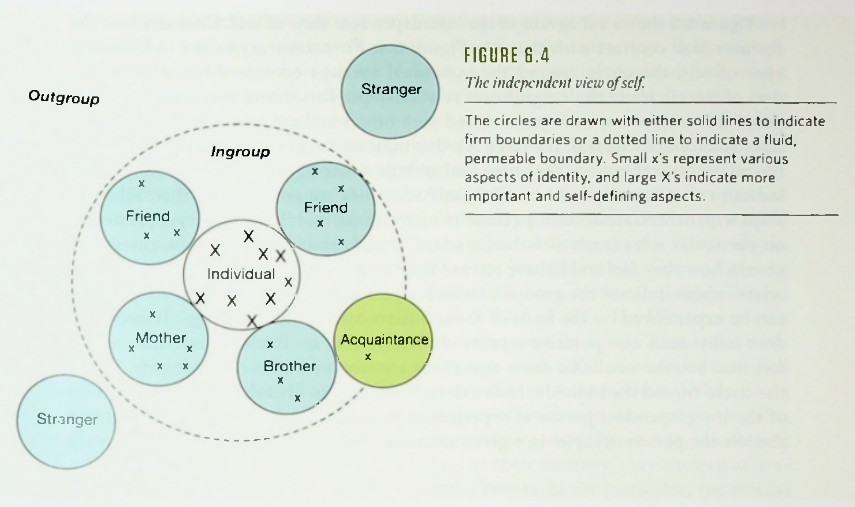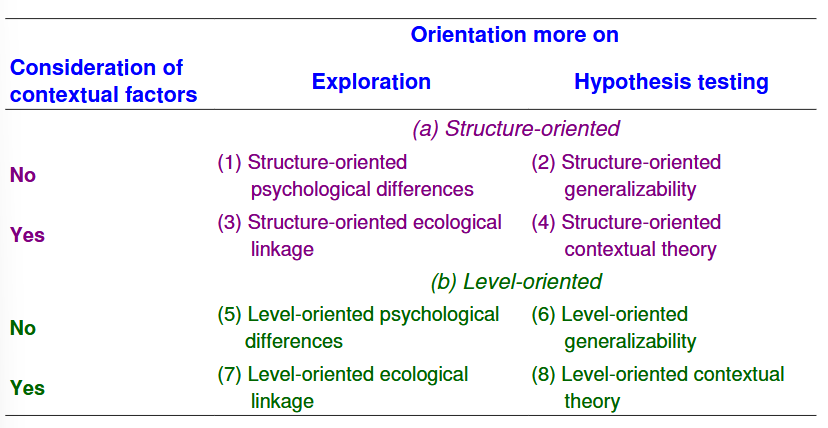Tutorial 1: Classics
1/32
There's no tags or description
Looks like no tags are added yet.
Name | Mastery | Learn | Test | Matching | Spaced |
|---|
No study sessions yet.
33 Terms
what does “general psychology” infer?
people and their minds are the same all round the world
Who suggested the CPU and what is it?
Richard Schweder suggested the brain is a “general processing unit” → works independently from culture and is the same in everyone
what is the basic idea of a cultural psychologist?
the mind is deeply influenced and entangled with culture
How did the “figure line task” show that culture shapes our mind?
americans performed better on absolute length task while East Asian performed better at the relative length task
(finding it harder → greater activation of inferior parietal lobe and right precentral gyrus = attentional control)
Why does culture shape our mind?
because our mind is plastic and keeps changing according to the experiences we make
what is the difference between the notion of sexuality in the sambian tribe and western societies?
in western sexuality is seen as an identity defining attribute while in sambia men go through all sexualities (first homosexual, then bisexual and then heterosexual)
what are the four levels of universality ?
non-universal (specific to a culture)
existential universal (function varies)
functional universal (accessibility varies)
accessibility universal (no variation at all)
what is the Müller-Lyeer Illusion and how is it connecte to culture?
only people from western cultures are fooled by the illusion because they are more frequently exposed to corners
what is a problem to consider about the psychological database with respect to culture?
it is mainly weird and therefore m´not representative
(wester, educated, industrialized, rich, democratic)
what is the “colour blind approach”?
ignoring the differences between cultures and treating people as if everyone is exactly the same despite different cultures
what is the multicultural approach?
focusing on the differences between people from different cultures
→ has been found to be more beneficial since minorites ca keep their own culture more
what is ethnocentricism?
judging people from other ethnicities based on standards of your own culture
what is the goal of the “20 statements test”?
measuring self concept
what is a main difference between the self concept between western and non-western individuals?
western people define themselves more by individual traits while eastern people define themselves more in terms of social roles
what are the key characteristics of an independent worldview?
self concept is derived from inner attributed
stable over time and across situations
line between ingroup and outgroup is not solid
identity = coherent entity
key boundary = self and non self

what are the key characteristics of an interdependent worldview?
identity= relation entitiy
identity is more fluid an malleable
defined by things outside of you
key boundary = ingroup vs outgroup
how does trust and commitment differ in independent and interdependent worldviews?
interdependent = more committed to ingroup, less cooperation with ourgroup; trust is more confined to ingroup
independent = less commitment to ingroup, trust is more general
what is the relationship between SES and inter/independent worldview and what is an exception?
low SES = interdependence
high SES = more independent
(exception impoverishment→ no relationships, Japan → high SES = more interdependent)
what is self consistency?
acting the same always, regardless of the circumstances (people, environment etc)
who suggested that we have a need for self consistency?
Leon Festinger
how is the experience of cognitive dissonance different for people with an independent vs interdependent worldview?
people with an independent worldvoew have a stronger need for SELF consistency but people with an interdependent worldview have a stronger need for consistency when other are involved
what are the two kinds of self-awareness?
subjective self awareness = perspective from within, unconscious, attention on outside world, I
objective self awareness = outside-in, me, as others see you/interact with you
what is the difference between self awareness and inter/independent worldview?
independent worldview → stronger subjective self awareness
interdependent worldview → stronger objective self awareness
who has usually a more accurate self view?
people with an objective self awareness (how other see them), often from collectivist cultures
what are implicit theories?
beliefs we take for granted that guide how we interpret the world
what is an incremental theory of self?
believing that character and traits are malleable and can change over time
what is an entity theory of self?
believing that out character stays the same throughout life, traits are seen as fixed and innate
what are etic and emic qualities?
etic= universal
emic= specific to culture
what are tight and loose cultures?
tight = strict norms that are expected to follow
loose = relaxed norms, not everyone is expected to follow them
what are prescriptive and proscriptive rules?
prescriptive = what should be done
proscriptive= what should not be done
what are the three dimensions of comparative studies?
exploratory vs. hypothesis testing
considering contextual factors or not
structure oriented vs. level oriented

what are the four types of structure oriented studies?
structure-oriented psychological differences
structure oriented generalizablity
structure oriented ecological linkage
structure oriented contextual theory
what are the four types of level-oriented studies?
level oriented psycholgical differences
level oriented generalizability
level oriented ecological linkage
level oriented contextual theory